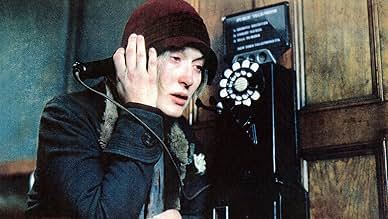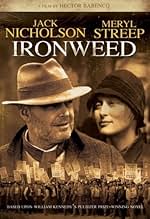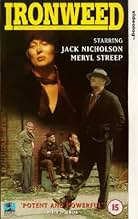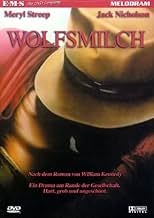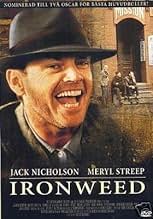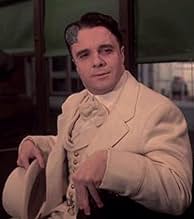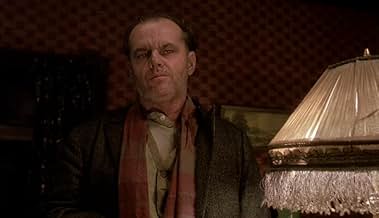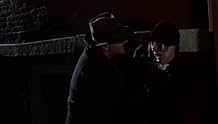CALIFICACIÓN DE IMDb
6.7/10
11 k
TU CALIFICACIÓN
Un vagabundo alcohólico pasa Halloween en su ciudad natal de Albany, Nueva York, tras regresar allí por primera vez en décadas.Un vagabundo alcohólico pasa Halloween en su ciudad natal de Albany, Nueva York, tras regresar allí por primera vez en décadas.Un vagabundo alcohólico pasa Halloween en su ciudad natal de Albany, Nueva York, tras regresar allí por primera vez en décadas.
- Nominado a 2 premios Óscar
- 2 premios ganados y 4 nominaciones en total
Opiniones destacadas
I had seen this movie when it first came out, and just seemed hopelessly depressing. Good acting and sets, but a story with little hope for anyone. Recently I re-watched it and have an appreciation for its accurate depiction of alcoholism. I think this story could take place in any decade and have the same outcome. But the fact its in the depression era drives it all home that much harder. Francis (Nicholson) plays a down trodden bum all too familiar with the alleys and soup kitchens of 1938 Albany NY. He has a casual relationship with Helen (Streep) who seems very down on her luck too. If Francis can stay sober for a few days, the kind priest at the mission finds him odd jobs for pay. But soon as Francis works, he drinks again. Helen also is quite a drinker, and the two try to take care of each other finding places to sleep and getting food to eat. Paying attention to the dialog and flashbacks, the viewer learns Francis and Helen had fairly illustrious and gruesome pasts. Francis is prone to seeing many 'ghosts' haunt him still. In a way to confront his past, he returns to his wife and family he had abandoned after a tragedy a few decades earlier. He makes amends as best he can, but redemption seems to get more elusive for him. Not that the film takes any hard stance on alcoholism, but I'd say shows that it's truly an incurable disease that can torture a person to utter hopelessness and still continue. Past accomplishments, future dreams, true love and devotion and loss are all meaningless when there's another drink to be had. So the movie I don't think will either sober a true alcoholic up by watching it - but may help? Nor do I think it will encourage anyone to take up the profession seriously - unless they already have the infliction? But to the good christian that is naive to the vices many of us get addicted to, I think this movie realistically shows the destructive torment and survival alcohol can cause, regardless of success, tragedy, or current blight. Beautifully ugly.
Cold, desolate in the surface and an uncomfortable warmth in the inside. Meryl Streep leads in a way that is difficult to explain. She provides a truly magic movie moment when she sings "He's My Pal" for her supper. For a moment we live her fantasy. Her moment is our moment, that's why as the song and the fantasy ends something inside me cracked. I felt tears running down my face and, I swear, I wasn't ready for that. The humanity of Meryl Streep, the actress, filters through the devastating circumstances of her character. Circumstances that, by the time we meet her, are already a way of life. At the beginning of the film, when somebody asks her how is she, her reply is "Delightful". Trying to adjust to this character I listen to her stained, tired voice, trying to be heard and I did, heard her. I love Meryl Streep.
"Ironweed" is a good movie and a scathing indictment of life in modern America. Jack Nicholson and Meryl Streep effectively portray a pair of homeless bums on the cold late October streets of Albany, New York during the Great Depression. Their day to day existence revolves around simple survival in the most difficult of circumstances -- how to keep from going hungry, where to score a few hours work or a few drinks, and where to "flop" come nightfall in order to avoid being beaten and robbed or freezing to death. You don't have to be a bum to understand this list of priorities, although certainly, spending any time without a conventional home will clue you in like nothing else can. There are, you see, several levels of homelessness, street people of various kinds occupying the lowest tier. A level above that are the people who live in their cars, camping at the curb or crashing with friends, some of them duly employed while others are "between jobs." Then there are those who spend months or even years living in recreational vehicles of one sort or another and migrating with the seasons. These are the elite of the homeless crowd, ranging from truly adventurous souls who occasionally go without enough food to those with substantial bank accounts and second homes. Nonetheless, most if not all of them understand something about being kicked around and shown the door, just like the bums in this flick. Certainly, they all understand what its like on occasion not to know where you will end up spending the night, why authority figures are to be avoided, and why conventional people are nearly always the enemy, whether they know it or not.
"Ironweed" puts a human face on the kinds of people society scorns the most -- street people, who live in filth and seldom wash, who often abuse alcohol or drugs yet haven't enough to eat and may dig through garbage searching for an abandoned morsel. They often live this way for a reason and not only because they have no choice. Frank has a choice but he is convinced that to go home "won't work out." He's a luckier bum than his fellows, who seem to have no choice at all. Oddly, it's pride just as much as eccentricity, incipient insanity, or alcoholism that keeps them where they are. Helen was a successful singer before her life went on the skids. Too much wine, a slump in her career, and being robbed of her inheritance seemed to signal her inevitable slide into oblivion. Now she barks at passersby and sleeps with whomever will tolerate her presence -- at a price, of course. Sandra is a drunk, an ex-whore, and in terrible shape when the others discover her passed out against a lamppost in freezing weather. They get her a blanket and some hot soup and prop her against a wall, but obviously, she is not long for this world. Rudy's a good sport, a bum's true friend, and he just scored a new gray suit, but he's been given six months to live and soon enough his new threads are grimy and tattered, just like the old ones. And so goes it. Only the strongest survive. All the while the comfortable bourgeoisie look upon the suffering of these brave souls with contempt, disgust, and often, unbridled hostility, hoping to avoid them and occasionally making them pay dearly for the inconvenience. Although the bums seem to scurry at the margins of society like rats on the prowl for scraps, they are, in a way, truly living. For however unenviable their precarious lot may be, they are on the edge, so unlike the predictable, dull, and hypocritical existence of the conventional folk around them. At times, one either knows or suspects that the bums are being romanticized or their foibles somewhat exaggerated, but nonetheless, the story comes off as reasonably authentic. And the acting in it is superb. One criticism, however -- the soft focus effect throughout. I take it the director was attempting to blur further the distinction between fantasy and reality, posing as it did a continuing problem for the main characters, who often dreamed of some simple connection to dignity, comfort, and security while in the throes of their unrelenting misery. Nonetheless, I would have preferred a sharp focus. Otherwise, I found this flick to be very inspired.
"Ironweed" puts a human face on the kinds of people society scorns the most -- street people, who live in filth and seldom wash, who often abuse alcohol or drugs yet haven't enough to eat and may dig through garbage searching for an abandoned morsel. They often live this way for a reason and not only because they have no choice. Frank has a choice but he is convinced that to go home "won't work out." He's a luckier bum than his fellows, who seem to have no choice at all. Oddly, it's pride just as much as eccentricity, incipient insanity, or alcoholism that keeps them where they are. Helen was a successful singer before her life went on the skids. Too much wine, a slump in her career, and being robbed of her inheritance seemed to signal her inevitable slide into oblivion. Now she barks at passersby and sleeps with whomever will tolerate her presence -- at a price, of course. Sandra is a drunk, an ex-whore, and in terrible shape when the others discover her passed out against a lamppost in freezing weather. They get her a blanket and some hot soup and prop her against a wall, but obviously, she is not long for this world. Rudy's a good sport, a bum's true friend, and he just scored a new gray suit, but he's been given six months to live and soon enough his new threads are grimy and tattered, just like the old ones. And so goes it. Only the strongest survive. All the while the comfortable bourgeoisie look upon the suffering of these brave souls with contempt, disgust, and often, unbridled hostility, hoping to avoid them and occasionally making them pay dearly for the inconvenience. Although the bums seem to scurry at the margins of society like rats on the prowl for scraps, they are, in a way, truly living. For however unenviable their precarious lot may be, they are on the edge, so unlike the predictable, dull, and hypocritical existence of the conventional folk around them. At times, one either knows or suspects that the bums are being romanticized or their foibles somewhat exaggerated, but nonetheless, the story comes off as reasonably authentic. And the acting in it is superb. One criticism, however -- the soft focus effect throughout. I take it the director was attempting to blur further the distinction between fantasy and reality, posing as it did a continuing problem for the main characters, who often dreamed of some simple connection to dignity, comfort, and security while in the throes of their unrelenting misery. Nonetheless, I would have preferred a sharp focus. Otherwise, I found this flick to be very inspired.
10copcigar
_Ironweed_ haunts for a long time after viewing, so be prepared. I also suggest that you be employed while you view this one.
William Kennedy's novel was an extreme work of beauty, and as much as I enjoyed and respected the novel, I never dreamed a film version could surpass it. In some ways at least, I believe this film does. Streep is luminous, no small feat while playing a drunk (they weren't called "homeless people" back then). And although he's proved it again since, this was the first time most of us saw Nicholson act. Tom Waits is terrific and gritty, Carroll Baker comes out of semi-retirement as though this was the one role she had left in her to play, and mixes pain and determination in just the right quantities.
Babenco clearly had a vision, and displays a maturity I hadn't expected from him. Even the score, a couple of tunes used over the opening and closing credits will make your heart ache.
It's all pathos, and it's all good. Grab it while you can -- I had to go to Canada and get a used copy online to find it at all. It was worth it.
William Kennedy's novel was an extreme work of beauty, and as much as I enjoyed and respected the novel, I never dreamed a film version could surpass it. In some ways at least, I believe this film does. Streep is luminous, no small feat while playing a drunk (they weren't called "homeless people" back then). And although he's proved it again since, this was the first time most of us saw Nicholson act. Tom Waits is terrific and gritty, Carroll Baker comes out of semi-retirement as though this was the one role she had left in her to play, and mixes pain and determination in just the right quantities.
Babenco clearly had a vision, and displays a maturity I hadn't expected from him. Even the score, a couple of tunes used over the opening and closing credits will make your heart ache.
It's all pathos, and it's all good. Grab it while you can -- I had to go to Canada and get a used copy online to find it at all. It was worth it.
Jack Nicholson usually relies on his quirky mannerisms and catch phrases; in this movie he shows his acting talents in a more serious manner. This movie is a brutal look at street people in the late 1930s. Meryl Streep immerses herself into her part as usual. This movie is harsh, cold and depressing. And the running time almost pushes two and a half hours long. I honestly don't know what they could have left out to make it shorter. Once is enough for this one. It will take a while for you to get your mind off of the abundance of hardship and sadness.
Nicholson and Streep are joined with a solid, diverse cast that includes Carroll Baker, Michael O'Keefe, Tom Waits, Nathan Lane and Fred Gwynne.
Nicholson and Streep are joined with a solid, diverse cast that includes Carroll Baker, Michael O'Keefe, Tom Waits, Nathan Lane and Fred Gwynne.
¿Sabías que…?
- TriviaArgentinean director Hector Babenco said of this picture: "It is a movie that tries to embrace the territories of love, and it's also about the courage and beauty of people we don't usually think of as having deep and complex emotions."
- ErroresAs the trolley being driven by the scab played by Nathan Lane approaches the union protesters, there are no trolley tracks between the mob and the trolley. In the next shot, they suddenly appear in the dirt under young Francis' feet.
- Bandas sonorasWhe You Were Sweet Sixteen
Words and Music by James Thornton
Selecciones populares
Inicia sesión para calificar y agrega a la lista de videos para obtener recomendaciones personalizadas
- How long is Ironweed?Con tecnología de Alexa
Detalles
- Fecha de lanzamiento
- País de origen
- Idioma
- También se conoce como
- Wolfsmilch
- Locaciones de filmación
- Productoras
- Ver más créditos de la compañía en IMDbPro
Taquilla
- Presupuesto
- USD 27,000,000 (estimado)
- Total en EE. UU. y Canadá
- USD 7,393,346
- Fin de semana de estreno en EE. UU. y Canadá
- USD 36,973
- 20 dic 1987
- Total a nivel mundial
- USD 7,393,346
- Tiempo de ejecución
- 2h 23min(143 min)
- Color
- Mezcla de sonido
- Relación de aspecto
- 1.85 : 1
Contribuir a esta página
Sugiere una edición o agrega el contenido que falta


